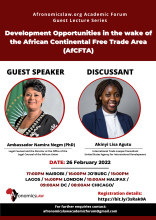African Union's Quest for 'One Voice': A Mixed Picture
The African Union (AU) was built on these unresolved differences that persist to this day. The Constitutive Act of the African Union (Art. 3) assigns to the AU the responsibility to 'promote and defend common African positions on issues of interest to the continent and its peoples.' The AU Commission (AUC) Statutes assigned the task of 'drafting AU common positions and coordinating Member States’ actions in international negotiations' to a Secretariat that had no supranational mandate. The writing was on the wall.
